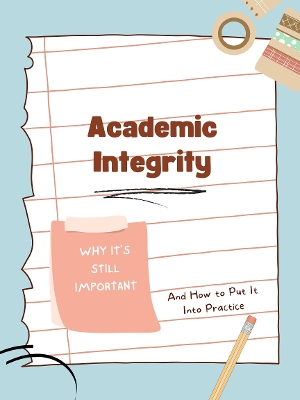Student Blog: Academic Integrity - Why It's Still Important and How to Put it Into Practice
Academic integrity is on every course syllabus, but here is why it is still critical in today's academic environment.
 With a new semester already underway, college students are taking time to settle into their new routine and familiarize themselves with their courses. While trying to get a sense of the workload and expectations for a course, students will always comb through the course syllabus. In addition to workload and structure, at the end of every syllabus, students typically see a section that they know all too well, the academic integrity section. While many overlook this section, believing it to be unimportant and self-explanatory, it becomes clear that academic integrity is not always easy to discern despite being still critical to a college student's success.
With a new semester already underway, college students are taking time to settle into their new routine and familiarize themselves with their courses. While trying to get a sense of the workload and expectations for a course, students will always comb through the course syllabus. In addition to workload and structure, at the end of every syllabus, students typically see a section that they know all too well, the academic integrity section. While many overlook this section, believing it to be unimportant and self-explanatory, it becomes clear that academic integrity is not always easy to discern despite being still critical to a college student's success.
At most universities, academic integrity is generally defined as creating and representing your own work. Academic integrity is considered to be violated when a student knowingly presents and submits someone else's work as their own. However, the specifics of how academic integrity is defined can differ depending upon the field of study or the particular course. For instance, in an acting course, collaborating with other students on a group project or presentation may be required under that professor's definition of academic integrity. Whereas, in a literature class, a professor may define academic integrity as writing your own papers and submitting the appropriate bibliography for your research, thus prohibiting group collaboration.
While these examples may seem self-explanatory, it is not uncommon for students to reach a point in their semester where they need help and have little time to fully complete an assignment, falling prone to the temptation to inappropriately seek outside resources or claim someone else's work as their own. Although it is easier said than done, one of the best ways to avoid this problem is to first work through difficult assignments by yourself rather than search for answers. The underlying reason is that when you try to find easy answers, your learning is interrupted as you begin to see your studies as a task to accomplish instead of an opportunity to improve your knowledge by absorbing information and working through tricky assignments. When you get frustrated and realize you absolutely need help after working through a paper or assignment, then it is often best to turn to a professor or teaching assistant (TA) who can guide you in the right direction in a way that upholds academic integrity. Furthermore, many course syllabi will list additional academic resources near the academic integrity section that are deemed appropriate to use. For instance, several colleges and universities offer writing assistance on papers or math and science tutoring that is tailored to a specific course. These resources are all opportunities for you to improve your skills and expand your knowledge without violating any critical codes of academic integrity.
Although academic integrity may initially appear as simple and easy to discern, students still find the gray areas when it comes to putting academic integrity into practice in challenging courses. Thus, by reaching out to professors, teaching assistants, and university resource centers, you can successfully work through difficult academic work, surprising yourself in the process as you create unique responses that represent the expansion of your knowledge.
Videos


